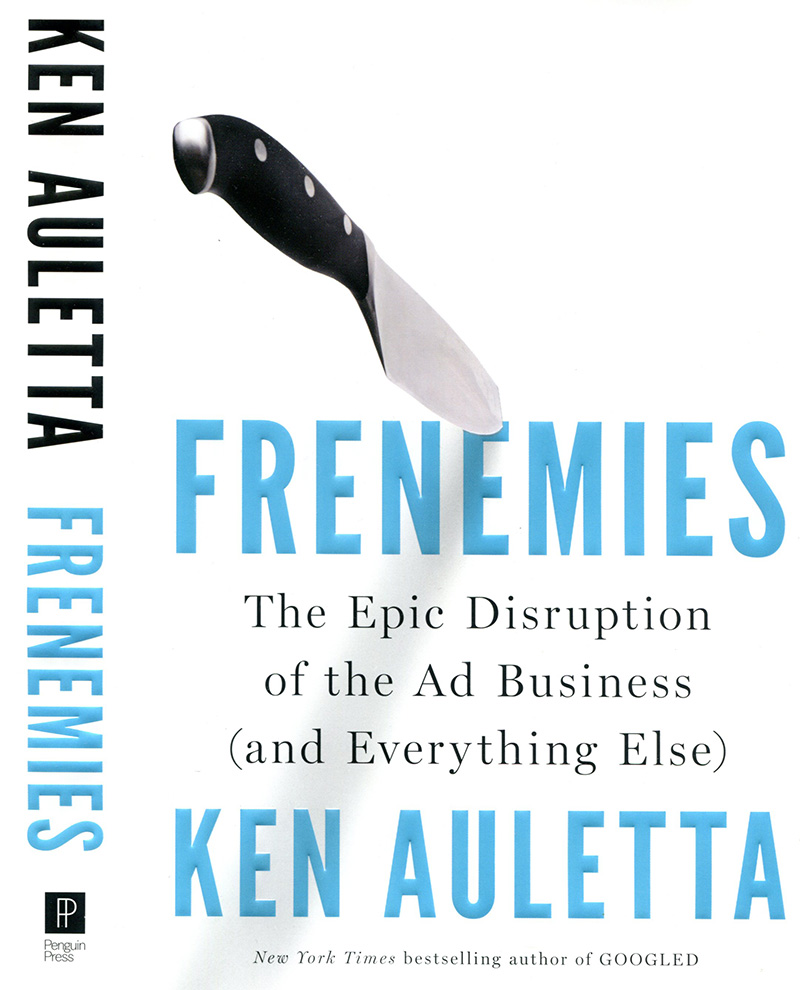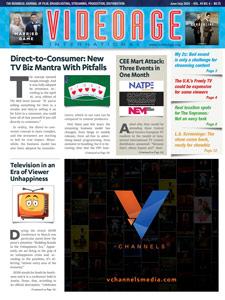“Frenemy” is an American word originally minted in 1953, but which only recently entered the common vernacular, and indicates persons (or companies) that are friends and enemies at the same time.
The term was recently borrowed by Ken Auletta, a veteran of the U.S. advertising industry, to ravage Madison Avenue and the digital media world in his latest book Frenemies, published in the U.S. by Penguin Press (358 pages, U.S.$30).
Frenemies’ subtitle, The Epic Disruption of the Ad Business (and Everything Else), summarizes the essence of the book, which forecasts the end of advertising agencies and denounces the rampant fraud in digital media.
The book makes lots of reference to Mad Men’s Don Draper, who Auletta says was inspired by legendary ad man David Ogilvy (1911-1999). This contrasts with previous reports that credit the inspiration to the original “Madman” of Madison Avenue, Jerry Della Femina.
According to Auletta, ad agencies these days are being threatened by new technologies such as programmatic ad buying and AI; by clients doing more creative work, by publishing platforms, and possibly, by the sheer size of the ad agencies themselves, which are crumbling under their own weight. To drive his point home, Auletta quotes Bob Greenberg, founder of R/GA, an international ad agency based in New York City and part of the large Interpublic Group of Companies: “Big agency holding companies are dinosaurs. They are collapsing because they are run by bean counters.” For good measure, he lets GE CMO Linda Boff add: “Big can be slow.”
The book, in this reviewer’s opinion, has a few purposes: to praise advertising executives Auletta admires (like Michael Kassan, Martin Sorrell, Carolyn Everson, and Irwin Gotlieb), to explain his vision of the impending demise of ad agencies mostly due to technology (especially the fight for big data, which he likens to “the new oil”), and the denunciation of fraud in digital media.
“Even more worrisome, clients are also doing more creative work in-house,” writes Auletta. Later on, he also explains why “Executives increasingly rely on PR crisis managers to douse fires…. Digital has made public relations much more important than it was… You can gain or lose a reputation at a click.” And to further illustrate that point, he cites the large PR firm Edelman, which developed a “social mission” for Vaseline, a Unilever product.
In Auletta’s book, Kassan — the founder and CEO of New York City-based MediaLink, a media consultancy company that works with agencies, brand advertisers, publishers, platforms and TV outlets — tackles the technology issue by stating, “Technology is the number one threat to agencies.” Recently, MediaLink was acquired by Ascential (formerly EMAP), the London-based company that runs Cannes Lions.
Auletta explains that Kassan has a simple explanation as to how advertising has evolved over the years: “It used to be Mad Men. Then it became Media Men. Now it’s Math Men.”
In the book, Sorrell — the 73-year-old former CEO of London-based WPP, the world’s largest advertising and marketing holding company — states that MediaLink, Facebook, and Google are all his frenemies. “They are not technology companies, they are platforms,” Sorrell is quoted as saying of Facebook and Google. Auletta also credits Sorrell with having popularized the term “frenemy.” (Sorrell resigned from his CEO post last April amid “personal misconduct” charges, but this is not explored in Auletta’s book since it went to press before the resignation.)
One interesting topic tackled in the book is the rise of ad blockers and native advertising, which, in Auletta’s view, happened because of the simple fact that there is “a revolt by consumers against all advertising.” And, he adds, “The creators of those ads would often be the publishers or the brands, not the ad agencies.”
The term “native” tends to create confusion between news and advertising, Auletta says. Years ago, advertorials were clearly marked as “advertising,” but, as Auletta explains, citing Margaret Sullivan, a former public editor of the Washington Times, “If native ads look too much like journalism, they damage credibility; if they look nothing like journalism, they lose their appeal to advertisers.”
“Some would call it deceptive advertising,” says Auletta. And yet, all the major U.S. newspapers are doing it, including the Wall Street Journal and The New York Times. Later, he quotes former GroupM (part of WPP) CDO Rob Norman trying to explain Donald Trump’s win: “If you have any doubt about the power of branded content, think of The Apprentice!” But Auletta also reports that “a Russian troll farm secretly purchased $100 million of ads to spread ‘fake news’ to further polarize Americans during the 2016 presidential contest.”
As for the future of advertising, Auletta puts too much weight in NewFronts, the May advertising event for digital media that is organized by the Interactive Advertising Bureau. NewFronts wants to compete with the Upfronts, the broadcasters’ ad sales bazaar, which is also held in May in New York City. He quotes Kassan as “declaring an end to the networks’ Upfronts monopoly,” with a preamble by Jim Bankoff, CEO of Vox Media, a digital media group, who implies that a premium digital video ad is superior to a broadcast premium ad because the former is “creative, it loads quickly and it engages me rather than interrupts me.”
Auletta shows how the action at the NewFronts was about digital media itself — not the content — and then goes on to quote the now former GroupM chairman Irwin Gotlieb, as saying, “Television continues to be a limited market.” He compares TV to a good vintage that creates scarcity: “Good wine and reduced supply equals a strong futures market.”
Returning to digital media, Auletta lets 21st Century Fox CEO James Murdoch vent his frustration: “What hasn’t been reported on is how much fraud there is in the industry… questions of viewability, questions of bots, of creating false impressions, the leakage –– the amount of fraud is staggering.”
Then Auletta reports that “in 2016, it was revealed that the Math Men at Facebook overestimated the average time viewers spend watching video by up to 80 percent.” And that “an internal audit revealed that Facebook miscounted views of four of its products… [At] the start of 2017, Facebook would admit a total of ten measurement mistakes.”
As if to balance his book’s reported criticism of Facebook, Auletta devotes almost an entire chapter to Carolyn Everson, a Kassan protégée who is a former COO of U.S. Ad Sales for Viacom’s MTV and now serves as Facebook’s VP of Global Marketing. Auletta clearly admires Everson and quotes her as saying: “We are not trying to disrupt agencies… I know people don’t believe that.”
Auletta lets Murdoch chastise the ad agencies, as well: “The bulk of Fox advertising will be sold by machines, and this will threaten the existence of the advertising holding companies.”
Towards the end of the book, Auletta lets Rishad Tobaccowala, the resident futurist for Publicis, reply to R/GA’s Bob Greenberg, “People [like Greenberg] say we are dinosaurs. We are not dinosaurs. We are cockroaches. Everybody hates us. Nobody likes to see us. But cockroaches have outlived everyone.”
(By Dom Serafini)
Audio Version (a DV Works service)










Leave A Comment